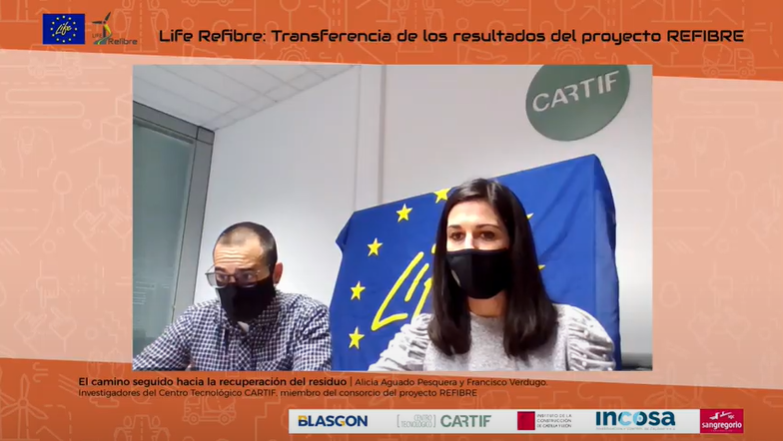On 17th December 2020, the fifth and last workshop of the project LIFE REFIBRE – Transfer of the final results of the REFIBRE project was held, organized by CARTIF, with the participation of the rest of the project partners (ICCL, INCOSA, SAN GREGORIO).
The objective of the LIFE REFIBRE project has been to promote the integrated management of plastic waste reinforced with glass fibres that makes up the wind turbine blades, once their useful life is over, promoting their complete, high-quality recycling.
This initiative, promoted by a consortium of Castilian Leonese entities, has achieved the recovery of the glass fibres contained in the wind turbine blades at the end of their useful life, in favor of a reduction in their presence in landfills, and providing them with a second life cycle, for an application with high added value: its incorporation into asphalt agglomerate.
The LIFE REFIBRE project has concluded, after more than three years of work and a total of five workshops developed by each of the members of the consortium that has participated in it: CARTIF, ICCL, GRUPO INCOSA, BLASGÓN and SAN GREGORIO, which has allowed to provide a global vision of the recovery process of plastic waste reinforced with glass fibre, which make up the wind turbine blades, explained in first person, with the difficulties that have been encountered, the lessons learned during the execution and the results achieved.
In all the workshops carried out, several leading experts have participated in order to convey to the attendees the importance of innovative initiatives for the achievement of the green transition, in general, and for the development of the circular economy. In particular, and thus with the help of researchers, R + D + i projects and the involvement of the industry, the contribution of all sectors has been sought.
In the last workshop, carried out by CARTIF, they reflected on the importance of applying the circular economy in the new projects that are carried out, always hand in hand with innovation. In the first part of it, the vision of circularity in construction was shared, thanks to the guidance of the head of the Roads and Environment group of the Construction Technology Center at ACCIONA, Edith Guedella, who was relieved by José Luis Martín, IBERDROLA’s head of renewable projects in Castilla y León, who provided examples of the implementation of the circular economy concept in the community’s wind farms.
Tomás Romagosa continued with the workshop, technical director of the Wind Business Association, who explained the current situation of the wind sector in Spain, the regulation, initiatives and possible solutions. Ángel Sampedro, professor-doctor in Highway Engineering at the Alfonso University X El Sabio, who spoke about the state of the network, the immediate future and the new challenges. The researchers from CARTIF, Alicia Aguado and Francisco Verdugo, were in charge of transferring the results obtained, highlighting the current problems of the wind turbine blades once its end of useful life has been reached, as well as, describing the main actions developed within the framework of the project, from the stage of collection and pretreatment of the blades; the design and construction of the recycling prototype and obtaining the glass fibre; the introduction of this glass fibre in asphalt mixtures; and the study of the environmental and socioeconomic impact of the project.
Likewise, in this last workshop, the importance of composite materials was stressed, the connecting link that the LIFE REFIBRE project has been able to use as a means to unite the wind and road sectors, through professionals such as Helena Abril , dynamization technique in the Spanish Association of Composite Materials, in the company of Luis Palenzuela, project manager at the TECNALIA technology center, who shared success stories and the importance of development in composite materials research, since it is about a world that offers many possibilities and that has an interesting future ahead of it. Finally, Ernesto Sáenz, from the wind energy department of the Centro Nacional de Energías Renovables, provided the considerations to take into account in the recycling of wind blades. And Jorge Dot, director at Wunder Hexicon in Spain and Pablo Gascón, R&D engineer at WunderHexicon and partner at WunderOcean, they presented an innovation project, in the space reserved for actions that promote R & D & i, demonstrating that there is still a long way to go and that the limit is set by us.
In the following link, through the project’s youtube channel, it can be seen a summary of the workshop.




